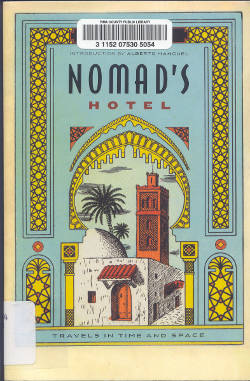Nomad's Hotel
Cees Nooteboom

“Crenellations, towers, domes, all of it shrouded in that vague curtain of winter and the coming evening, a curtain I cannot draw aside. It moves softly, the palaces bob and float. When I reach the town I turn left and walk, still by the water, toward the Porta San Giorgio, until I am standing in front of the forbidding, deathly silent mass of the Palazzo Ducale. No sentries, no horses; in the deserted courtyard a car suddenly starts and jolts me out of the past. I can see the back of a wide flowing cloak and the theatrical gesture of a crowned head high on the baroque façade of the cathedral. In the Romanesque campanile a bell starts to toll, deep and somber, as though the invisible bell-ringer knows the sound will be muffled by the mist, and that no one will answer his summons. The square in front of the cathedral is empty, a stone piazza surrounded by high buildings. Time cannot act and history is nothing more than a collection of moments – so just how does one refer to the powers that preserve and at the same time alter a square like this?”
The preceding passage comes from Cees Nooteboom's book, Nomad's Hotel. The author, who is Dutch, has published nine novels and more than a dozen collections of travel writing. Subtitled Travels in Time and Space, this collection showcases some of the writer's best work, including this selection from an essay about the Aran Islands, off the west coast of Ireland:
“Once upon a time Latin-speaking monks had landed here, and the essence of what they brought had been preserved. A different language, the same words. A different time, the same forbidding block of stone. The church was not large yet its interior was surprisingly spacious. The Mass was in Gaelic. I know what was being said, but I couldn't understand a word. The dark days before Christmas, the priest's chasuble, the mauve of advent the only color among all that stone. The sermon echoed about me, a language of shells and stones, ancient words that penetrated all the surrounding heads and shut me out, but it did not matter, I could sense the community of the others, a product of centuries of isolation and extreme poverty. The unending struggle for food, fish from a jealous, dangerous ocean, earth scraped from between rocks and spread upon layers of seaweed and sand so as to grow a few potatoes, livestock on a few patches of fertile ground, always enclosed by walls of piled stones which first had to be hewn out and dragged there, light from oil lamps until well into the last century, oil obtained from the livers of sharks and seals, houses made of the stone upon which they stood, roofs of rye straw. Even though times have now changed, all this is still visible on faces that continue to bear the stamp of life as a hazardous undertaking.”
Part travelogue, part history, part poetry, Nooteboom's writing conjures up places most of will probably never see. If you feel that you'd like to check into this Nomad's Hotel, be sure to read all about it!
All Rights Reserved.